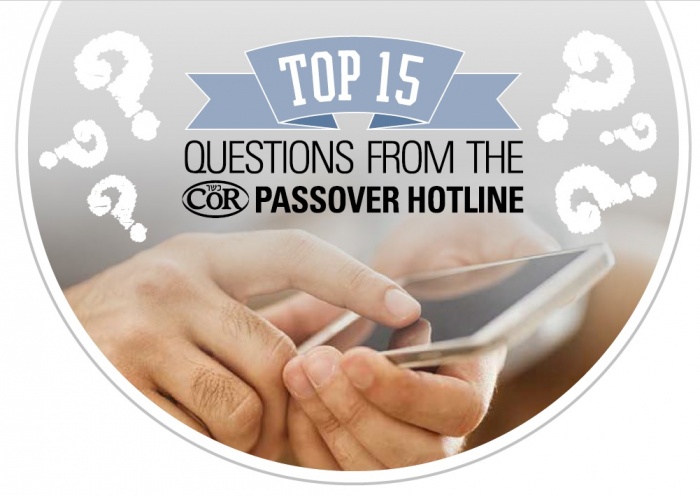COR is pleased to answer questions from kosher consumers throughout the year. This service is especially popular during the weeks leading up to Passover, as evidenced by the over 5000 questions answered last year prior to Passover.
If you have a question that you do not see answered in this COR Passover magazine email us at questions@cor.ca or call the COR Passover Hotline at (416)635-9550 ext. 100. You can also use our Text-A-Question service by texting your question to (647)402-1910 for yes/no questions.
Here is a list of the more frequently asked questions from last year:
1. Does sugar require Kosher for Passover (KFP) certification?
Answer: Regular white sugar does not require Passover certification. However, some companies will re-pack sugar using the same filling machines as other products and there might be cross contamination. Therefore, avoiding plastic containers and sugar from discount retailers (such as Dollarama) is recommended as these are likely to have been packed by third party companies. So to clarify:
1. 2 Kilo and industrial sugar – No Passover Certification Required
2. Avoid plastic containers and sugar from discount retailers (such as Dollerama) as these are likely to have been packed by third party companies
3. For the following Redpath products – No Passover Certification is Required:
a. Redpath sugar packets
b. Redpath sugar cubes (white and brown)
c. Redpath Dark and Light Brown Sugar, Golden and Light Yellow Sugar, and Demerara Sugar
2. May extra virgin olive oil be purchased without certification?
Answer: NO. We became aware of reports claiming that much of what is being sold as extra virgin olive oil is actually diluted with lower grade olive oil, sunflower oil, or canola oil. Indeed, an industry expert stated that “75-80 percent of the oil sold in the U.S. does not meet the legal grades for extra-virgin oil.” As a result, we can only recommend extra virgin olive oil that carries Passover certification or whose status has been vouched for by another reliable kosher certifier.
3. Do lemon or lime juice products require KFP certification?
Answer: YES. But RealLemon, Lemon juice, and RealLime Lime juice certified by the OU are acceptable for use on Passover even without KFP certification.
4. Does toothpaste need to be chametz free?
Answer: Since toothpaste is used orally, it should be chametz free. All Colgate and Sensodyne toothpastes are chametz free.
5. Do sliced raw mushrooms need KFP certification?
Answer: NO
6. Do spray & liquid deodorant, hairspray and perfume need to be chametz free?
Answer: Since it is theoretically possible to distill alcohol found in these products and restore the alcohol to an edible state, they should be chametz free. The same applies to dry shampoo. All stick deodorants however are acceptable.
7. Which alcohols that are found in personal care products are problematic on Pesach and which are not?
Answer: Alcohol that contains chametz could be referred to in any of the following ways:
1. Ethyl Alcohol
2. Ethanol
3. Denatured Alcohol
4. Alcohol Denat.
5. SD Alcohol
6. SDA or SDA Alcohol
7. Alcohol
The following are not sourced from chametz:
1. Benzyl Alcohol
2. Cetyl Alcohol
3. Isopropyl Alcohol
4. Methanol
5. Stearyl Alcohol
8. Does frozen fruit need KFP certification?
Answer: Any frozen fruit, whole or sliced, that is unsweetened and without additives (i.e. syrup, citric acid, ascorbic acid, vitamin C) is acceptable without KFP certification.
9. Which coffees do and don’t require KFP certification?
Answer:
a. All regular ground coffees are acceptable for Passover use.
b. Decaffeinated coffee: Coffee is often decaffeinated by means of ethyl acetate, which is derived from either kitniyot or chametz. Therefore, decaffeinated coffee requires Passover certification.
c. All flavoured coffee requires Passover certification.
d. Instant coffees often contain maltodextrin, which is derived from either kitniyot or chametz. Therefore, all instant coffees require Passover certification. Nescafe Taster’s Choice and Folgers Instant Coffee are acceptable even without Passover certification. Please note: Nescafe Rich Instant Coffee is not acceptable for use on Passover the two products do look similar.
10. Can I purchase a cup of black coffee at a non-kosher establishment such as Starbucks or Tim Horton’s?
Answer: Definitely not. These establishments bake items such as muffins and donuts which are chametz and as such all of the utensils used are chametz.
11. What medications are recommended for children during Passover?
Answer: The following are both acceptable on Passover and do not contain non-kosher ingredients:
1. Liquid Tempra
2. Advil- Children Suspension (All Flavours), Pediatric Drops
3. Advil- Junior Strength Swallow Tablets (NOT Chewables)
4. Motrin Suspensions and Concentrated Drops
5. Claritin Kids Syrup
6. (Although not a children’s medication – Benadryl Elixir is chametz free as well).
12. Does frozen salmon require Passover certification?
Answer: Frozen salmon requires Passover certification.
This is a list frozen salmon that is acceptable even without Passover certification:
1. Kirkland Atlantic (Farm Raised) Salmon when it bears the Kof-K symbol
2. Kirkland Wild Frozen Salmon only after rinsing it off (Kof-K)
13. Is Metamucil suitable for use on Passover?
Answer: Only the Metamucil Original Coarse Powder is acceptable. It is also kitniyot free. It is also acceptable with Non-Medicinal Ingredient: Sucrose
14. How about Benefibre?
Answer: Benefibre is acceptable for use on Passover in Canada. Please note Benefiber from the United States has a different formula and is not kosher for Passover.
15. And Restoralax?
Answer: Restoralax is acceptable for use on Passover.

